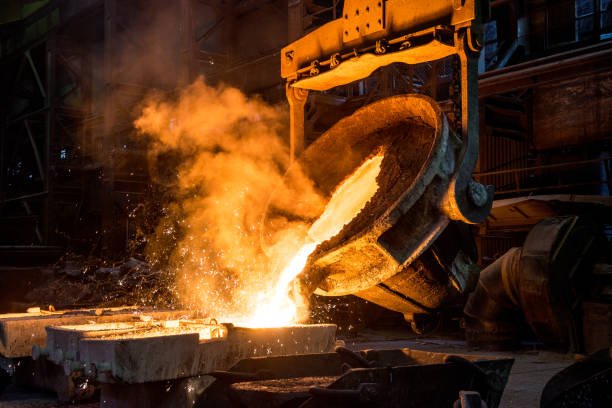97% Carburo de silicio negro SiC como refractario

Carburo de silicio, más específicamente, carburo de silicio negro (Sic), Es un material potente y versátil que ofrece numerosos beneficios para uso refractario.. Gracias a su tolerancia a altas temperaturas y resistencia al desgaste., 97% El carburo de silicio negro SiC se ha convertido en la solución ideal para diversos procesos industriales..
Entendiendo el carburo de silicio (Sic)
Para comprender el impacto de 97% Carburo de silicio negro SiC en la industria refractaria, Primero debemos entender qué es el carburo de silicio.. El carburo de silicio es increíblemente duro., compuesto cristalino producido sintéticamente de silicio y carbono. Reconocido por su resistencia a altas temperaturas., choque térmico, y estrés mecánico, El carburo de silicio es un material versátil utilizado en muchas industrias..
- Alta dureza y resistencia: El carburo de silicio tiene una dureza de 9 en la escala de mohs, superado sólo por el diamante, nitruro de boro cúbico, y carburo de boro.
- Excelente conductividad térmica: El SiC es conocido por su excelente disipación de calor., lo que lo convierte en un material ideal para aplicaciones que requieren alta conductividad térmica.
- Inercia química: El SiC exhibe una excelente resistencia a los ácidos fuertes, álcalis, y otros productos químicos agresivos, manteniendo sus propiedades incluso en condiciones extremas.
La composición: 97% Carburo de silicio negro SiC
97% El carburo de silicio negro SiC se refiere a la pureza del carburo de silicio.. En este caso, 97% del material está compuesto de carburo de silicio, ofreciendo propiedades superiores en comparación con sus homólogos de menor pureza. Este nivel de pureza garantiza un rendimiento óptimo., durabilidad, y longevidad, lo que lo convierte en una opción ideal para aplicaciones refractarias.
Proceso de fabricación de 97% Carburo de silicio negro SiC
Produciendo alta calidad, 97% El carburo de silicio negro SiC es un proceso complejo que consta de varias etapas.
- Mezcla de materiales: El proceso comienza con la mezcla de materias primas., principalmente arena de cuarzo (SiO2), coque de petróleo (do), y carbono de alta calidad (do).
- Fusión de alta temperatura: Luego, los materiales mezclados se calientan a temperaturas superiores a 2000 °C en un horno de resistencia eléctrica.. Este calor extremo desencadena una reacción que forma SiC básico..
- Enfriamiento y molienda: Después del proceso de fusión, el material se enfría, aplastado, y molido en gránulos o en polvo, creando el producto base de carburo de silicio negro.
¿Por qué elegir? 97% Carburo de silicio negro SiC en aplicaciones refractarias
Cuando se trata de aplicaciones refractarias, 97% El carburo de silicio negro SiC tiene varios atributos destacados que lo convierten en una excelente opción.:
- Resistencia a altas temperaturas: Su capacidad para soportar temperaturas extremas lo hace ideal para su uso en hornos y hornos..
- Resistencia a la oxidación: El alto contenido de SiC en 97% El carburo de silicio negro también le otorga una resistencia superior a la oxidación a altas temperaturas..
- Resistencia a la abrasión y al desgaste: Su impresionante dureza garantiza una excelente resistencia al desgaste., reduciendo la necesidad de reemplazos frecuentes y mejorando la eficiencia operativa general.
- Estabilidad química: Su capacidad para resistir la interacción con una variedad de productos químicos previene la degradación del material., Garantizar el rendimiento a largo plazo de los componentes refractarios..
Conclusión
La introducción de 97% La incorporación del carburo de silicio negro SiC a la industria refractaria ha revolucionado muchas prácticas tradicionales. Con su impresionante lista de propiedades, incluida la tolerancia a altas temperaturas., resistencia al desgaste, y estabilidad química, Este material versátil continúa demostrando su valor en una infinidad de aplicaciones industriales.. Al comprender sus propiedades, proceso de fabricación, y los beneficios que proporciona, las industrias pueden aprovechar eficazmente 97% Carburo de silicio negro SiC para mejorar la eficiencia y confiabilidad en sus aplicaciones refractarias.
Usted también puede estar interesado en…
Contáctenos
Obtenga una cotización gratuita
Fundado en 2001, HSA es un proveedor líder de abrasivos y humo de sílice en China, y también la fuente premium de productos de alto rendimiento para las industrias del hormigón y los abrasivos..



